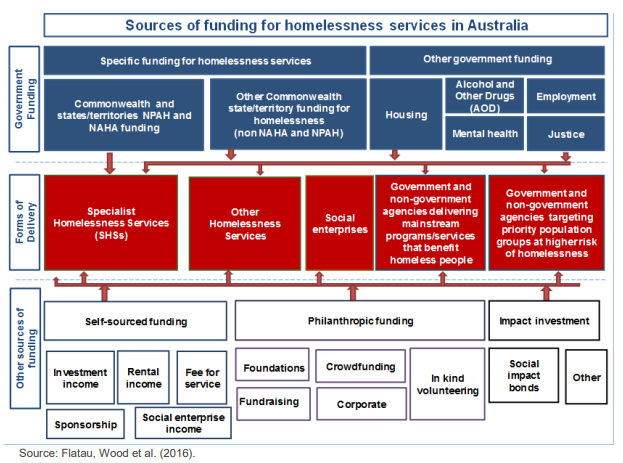
Two thirds of homelessness services don’t have enough funding to meet demand
New AHURI research finds that additional funding models are needed to help meet demand
09 May 2017
New research from AHURI finds that Australia’s homelessness services are overwhelmingly unable to meet client demand and that additional funding models are needed to address the critical unmet need for housing and homelessness services.
The final report from the AHURI Inquiry into funding and delivery of programs to reduce homelessness, undertaken by the Centre for Social Impact at The University of Western Australia (CSI UWA), Swinburne University of Technology and the University of New South Wales, found that government funding currently accounts for 85 per cent of funding received by specialist homelessness services. However, additional revenue sources, including philanthropy, corporate sponsorship, donations and new forms such as social enterprises and social impact bonds (SIBs), are essential to supplement government funding in order to meet demand and implement innovative solutions for housing, co-ordinated support and employment.
Figure 1: Sources of funding for specialist homelessness services, 2013–15, N=216

Source: Flatau et al.(2017) Inquiry into funding and delivery of programs to reduce homelessness, AHURI Final Report No. 279
Lead author Professor Paul Flatau, Director of CSI UWA, said ‘As we would expect, there is a heavy reliance on government funding by homelessness services, and we know that this is considered essential to providing core services. However, with this reliance comes vulnerability to changes in government policy. Greater stability of government funding of homelessness services is needed together with a positive environment for increased giving, own revenue income and impact investment in affordable housing and homelessness support including, but not only, through SIBs.’
‘If we look at ways that the homelessness sector can diversify their funding sources, we can begin to shore up those gaps that exist, particularly in areas that government funding doesn’t reach, such as a coordinated response to address the very high rates of Indigenous homelessness,’ said Professor Flatau.
...there is a heavy reliance on government funding by homelessness services, and we know that this is considered essential to providing core services... with this reliance comes vulnerability to changes in government policy.
The report recommends that more funding is required for capital projects to create a greater supply of accessible, affordable housing to help stem the inflow of people into homelessness and assist people to exit homelessness. There is also a need for government funding into the community housing sector so that it has the confidence to scale up investment in affordable housing.
In addition, the report recommends renewed focus on early intervention strategies to reduce homelessness and on cross-sectoral, inter-governmental and cross-departmental government funding packages for integrated service approaches. Professor Flatau also called for a greater focus on funding for outcomes achieved with different pay for success structures.
The research report is available to download from the AHURI website at http://www.ahuri.edu.au/research/final-reports/279
A video of Professor Flatau speaking about the findings of the research at the recent AHURI conference, Homelessness and housing solutions, can be viewed below.
